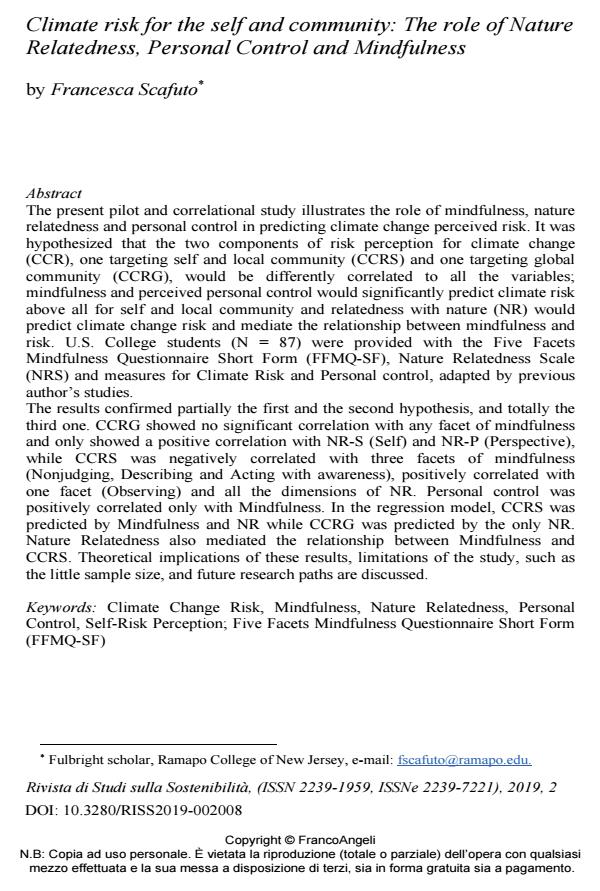Climate risk for the self and community: The role of Nature Relatedness, Personal Control and Mindfulness
Titolo Rivista RIVISTA DI STUDI SULLA SOSTENIBILITA'
Autori/Curatori Francesca Scafuto
Anno di pubblicazione 2020 Fascicolo 2019/2
Lingua Inglese Numero pagine 20 P. 89-108 Dimensione file 311 KB
DOI 10.3280/RISS2019-002008
Il DOI è il codice a barre della proprietà intellettuale: per saperne di più
clicca qui
Qui sotto puoi vedere in anteprima la prima pagina di questo articolo.
Se questo articolo ti interessa, lo puoi acquistare (e scaricare in formato pdf) seguendo le facili indicazioni per acquistare il download credit. Acquista Download Credits per scaricare questo Articolo in formato PDF

FrancoAngeli è membro della Publishers International Linking Association, Inc (PILA), associazione indipendente e non profit per facilitare (attraverso i servizi tecnologici implementati da CrossRef.org) l’accesso degli studiosi ai contenuti digitali nelle pubblicazioni professionali e scientifiche.
The present pilot and correlational study illustrates the role of mindfulness, nature relatedness and personal control in predicting climate change perceived risk. It was hypothesized that the two components of risk perception for climate change (CCR), one targeting self and local community (CCRS) and one targeting global community (CCRG), would be differently correlated to all the variables; mindfulness and perceived personal control would significantly predict climate risk above all for self and local community and relatedness with nature (NR) would predict climate change risk and mediate the relationship between mindfulness and risk. U.S. College students (N = 87) were provided with the Five Facets Mindfulness Questionnaire Short Form (FFMQ-SF), Nature Relatedness Scale (NRS) and measures for Climate Risk and Personal control, adapted by previous author’s studies. The results confirmed partially the first and the second hypothesis, and totally the third one. CCRG showed no significant correlation with any facet of mindfulness and only showed a positive correlation with NR-S (Self) and NR-P (Perspective), while CCRS was negatively correlated with three facets of mindfulness (Nonjudging, Describing and Acting with awareness), positively correlated with one facet (Observing) and all the dimensions of NR. Personal control was positively correlated only with Mindfulness. In the regression model, CCRS was predicted by Mindfulness and NR while CCRG was predicted by the only NR. Nature Relatedness also mediated the relationship between Mindfulness and CCRS. Theoretical implications of these results, limitations of the study, such as the little sample size, and future research paths are discussed.
Parole chiave:Climate Change Risk, Mindfulness, Nature Relatedness, Personal Control, Self-Risk Perception; Five Facets Mindfulness Questionnaire Short Form (FFMQ-SF)
- Enhancing Universal Values Through Mindfulness and Psychological Well-Being: A Randomized-Controlled Trial with Adolescents Francesca Scafuto, Cristiano Crescentini, Ciro Conversano, Alessio Matiz, Francesco De Vincenzo, Silvia Ghiroldi, Federico Nitamo Montecucco, Fabio Presaghi, Rossella Mattea Quinto, in Child & Youth Care Forum /2025 pp.1459
DOI: 10.1007/s10566-025-09871-7 - Promoting well‐being in early adolescents through mindfulness: A cluster randomized controlled trial Francesca Scafuto, Silvia Ghiroldi, Nitamo Federico Montecucco, Francesco De Vincenzo, Rossella Mattea Quinto, Fabio Presaghi, Luca Iani, in Journal of Adolescence /2024 pp.57
DOI: 10.1002/jad.12252 - MINDhEARTH: a school-based intervention to improve personal well-being, mindfulness and connectedness to nature in adolescents Francesca Scafuto, Ciro Conversano, Fabio Presaghi, Giulia Santoni, Ilaria Vaglini, Francesco Girardi, Alessio Matiz, Cristiano Crescentini, in Frontiers in Psychology 1628048/2025
DOI: 10.3389/fpsyg.2025.1628048
Francesca Scafuto, Climate risk for the self and community: The role of Nature Relatedness, Personal Control and Mindfulness in "RIVISTA DI STUDI SULLA SOSTENIBILITA'" 2/2019, pp 89-108, DOI: 10.3280/RISS2019-002008